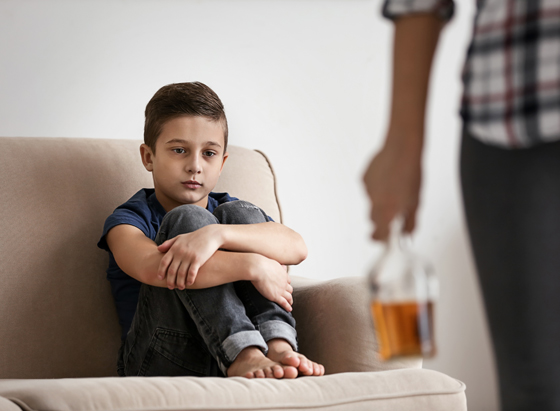How to help an alcoholic
Last Updated:
May 7th, 2024
While alcoholism is often seen as only affecting the individual, it can have a profound effect on the lives of those closest to them. While friends and family often bear the brunt of a loved one’s alcohol addiction, they can also be the best placed to help them overcome their addiction.
When to help an alcoholic loved one
It can be difficult to know whether someone you love needs alcoholic help as there is a difference between people who drink a lot and those with alcoholism. Differentiating the signs of alcoholism from those of a heavy drinker can be difficult but if your loved one is exhibiting any of these symptoms, it may be time to approach them with your concerns:
- Mood or behavioural changes when drinking which are making them difficult to be around
- Neglecting or abusing family or friends when drunk, hungover or seeking alcohol
- Being secretive or dishonest about their drink
- Experiencing blackouts or memory loss as a result of drinking
- Continuing to drink despite the problems it is causing for you and them
- Experiencing health issues as a result of their drinking
- Wasting your family’s money on alcohol and putting strains on your finances
If you are concerned that your loved one may be struggling with alcoholism, the best time for an intervention for addiction is right now. Alcoholism is a serious illness that can have devastating consequences if left untreated.
How to help an alcoholic husband
Depending on who needs help with alcoholism, there may be different approaches to take: Here are some tips for giving you the best chance of supporting different family members and friends in overcoming their alcohol addiction:
How to help an alcoholic husband
It can often be hard to talk to husbands who are addicted to alcohol because men are traditionally less encouraged to speak about their feelings. However, it is important to try and understand what is fuelling his drinking so that you can offer targeted support. He may be struggling at work, worried about finances or finding his parental or childcare duties overwhelming. Sit down with him and see if there is anything you can do to take some of this burden off his shoulders while he gets the help he needs.
Speak to your husband calmly and give specific examples of the impact his alcohol addiction is having on your marriage and family. Perhaps you had always talked about taking a holiday to a certain place together or paying off your mortgage by a certain time but the financial effects of his addiction have made that impossible. Giving clear examples like this can help your husband to see through the fog of addiction and give him the impetus he needs to seek help.
How to help an alcoholic wife
While more men than women drink alcohol, both are at equal risk of alcoholism. Watching your wife suffer from alcoholism can be heartbreaking but there are effective ways that you can help her beat the condition.
First, as with all loved ones with addiction, try to be understanding and patient. Second, try to find out what the triggers for your wife’s addiction are. Is she bearing more of the childcare or other responsibilities which are causing her excessive stress? If so, see if you can support your wife more and provide her with the time and energy to focus on her recovery. Finally, encourage your wife to seek help and that you will take care of her normal responsibilities while she is in alcohol detox and rehab. If you are supportive and understanding, you can play a vital role in helping your wife overcome her addiction.
How to help an alcoholic parent
Supporting an alcoholic parent can be challenging, as parental alcoholism can lead to child neglect, verbal and physical abuse, and reduced involvement in their family’s lives. Knowing how to help an alcoholic father or mother can be difficult but it is possible to be a force for their change:
First, it is important to set boundaries with your parent. This means communicating your expectations clearly and standing up for yourself when necessary. Second, it is important to build a support system for yourself. This could include family, friends or a professional counsellor. These people can offer you guidance and support when things get tough. Lastly, it is important to remember that you are not responsible for your alcoholic mother or father’s condition. You cannot fix them and you cannot make them stop drinking but you can offer in a way that is positive and helpful for both of you.
How to help an alcoholic sibling
Supporting an alcoholic sibling can be a difficult and challenging task. There are a few unique challenges that you may face when supporting an alcoholic brother or sister.
First, you may have to deal with a lot of denial from your sibling. They may not want to admit that they have a problem and may become defensive when you try to talk to them about it for fear of you telling your parents. Second, you may have to deal with their drinking buddies who your sibling may be closer to than they are to you. These people may enable your sibling’s drinking and make it difficult for you to get them into treatment. Finally, they may resent you for trying to tell them what to do. An alcoholic sibling may point out that you are not their parent and so you can’t tell them what to do.
The best thing to do is to address your concerns with your sibling directly from a place of patience and understanding. If possible, try to involve parents or other friends and family members who can show your sibling that their drinking is causing a lot of concern.
How to help an alcoholic friend
One of the unique challenges that an alcoholic friend can cause is that their alcohol addiction can lead to them behaving in ways that are out of character. They may say or do things that hurt you and it can be difficult to see past this to the person you care about. It is important to try to remember that your friend is not in control of their illness, and they are not acting maliciously.
Firstly, try to maintain open communication with your friend even if they are not putting any effort into your friendship. This can be difficult, as they may be unwilling to talk about their addiction, but it is important to keep the lines of communication open. Secondly, try not to enable them by continuing to support them financially or going out drinking with them. Finally, be prepared to walk away if your friend’s behaviour has become toxic. There will always be a chance in the future to rebuild your relationship when they are ready to make a change.
How to help an alcoholic child
It can be heartbreaking to have an adult child who is struggling with alcohol addiction but you are not alone. Many parents find themselves in your shoes, wondering how to best support their child while also maintaining their own well-being.
First, try to remain calm and avoid any sort of confrontation. This can be difficult, but it’s important to remember that your child is not in a rational state of mind and will not respond well to threats. Second, avoid enabling your child’s alcoholism by providing them with money or a place to stay. This may seem like a compassionate thing to do, but it will only prolong the addiction and make it harder for your child to get the help they need. Finally, involve other family members or friends who your child is close to as this can help overcome any denial.
It is important to understand that alcoholism can cause immense stress and conflict between loved ones and can sometimes lead to emotional abuse and domestic violence. If your alcoholic loved one is in any way abusive, the most important thing is to ensure that you and any children are safe before you worry about helping them with their alcoholism.
How to help an alcoholic loved one in rehab
If your loved one is in rehab, it is important to offer continued support throughout their treatment. This may mean attending family therapy sessions, visiting them regularly or sending them encouraging letters or care packages. This can give them the strength they need to get through the rehab process and prevent them from feeling homesick.
Preparing your home for your loved one’s return
If you are preparing for your loved one to come home from alcohol rehab, there are a few things you can do to make the transition easier. First, try to clear out any alcohol or drugs that may be in the house. Second, have a plan in place for how you will deal with relapses or difficult situations. Finally, (in a calm and loving way) set boundaries with your loved ones and explain that you are there to help them but they need to respect those boundaries.
Final thoughts
When you help an alcoholic loved one, you can truly be a force of transformation in their life. Alcoholism can change a person so much that when a friend or family member overcomes their addiction, it can feel like having them back after years apart. Get in touch with Sanctuary Lodge today and find out more about how we can give your loved one the alcohol addiction help they need.





